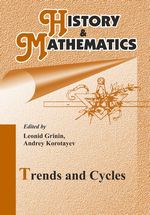
|
History & Mathematics:Trends and CyclesBibliography: Volgograd: ‘Uchitel’ Publishing House, 2014. – 328 pp.
Edited by: Leonid Grinin, Andrey Korotayev
ISBN 978-5-7057-4223-3 Editorial Council:
Herbert Barry III (Pittsburgh University), Leonid Borodkin (Moscow State University; Cliometric Society), Robert Carneiro (American Museum of Natural History), Christopher Chase-Dunn (University of California, Riverside), Dmitry Chernavsky (Russian Academy of Sciences), Thessaleno Devezas (University of Beira Interior), Leonid Grinin (National Research University Higher School of Economics), Antony Harper (New Trier College), Peter Herrmann (University College of Cork, Ireland), Andrey Korotayev (National Research University Higher School of Economics), Alexander Logunov (Russian State University for the Humanities), Gregory Malinetsky (Russian Academy of Sciences), Sergey Malkov (Russian Academy of Sciences), Charles Spencer (American Museum of Natural History), Rein Taagapera (University of California, Irvine), Arno Tausch (Innsbruck University), William Thompson (University of Indiana), Peter Turchin (University of Connecticut), Douglas White (University of California, Irvine), Yasuhide Yamanouchi (University of Tokyo).
|

The present yearbook (which is the fourth in the series) is subtitled Trends & Cycles. It is devoted to cyclical and trend dynamics in society and nature; special attention is paid to economic and demographic aspects, in particular to the mathematical modeling of the Malthusian and post-Malthusian traps' dynamics.
An increasingly important role is played by new directions in historical research that study long-term dynamic processes and quantitative changes. This kind of history can hardly develop without the application of mathematical methods. There is a tendency to study history as a system of various processes, within which one can detect waves and cycles of different lengths – from a few years to several centuries, or even millennia. The contributions to this yearbook present a qualitative and quantitative analysis of global historical, political, economic and demographic processes, as well as their mathematical models.
This issue of the yearbook consists of three main sections: (I) Long-Term Trends in Nature and Society; (II) Cyclical Processes in Pre-industrial Societies; (III) Contemporary History and Processes.
We hope that this issue of the yearbook will be interesting and useful both for historians and mathematicians, as well as for all those dealing with various social and natural sciences.
The present research has been carried out in the framework of the project of the National Research University Higher School of Economics.